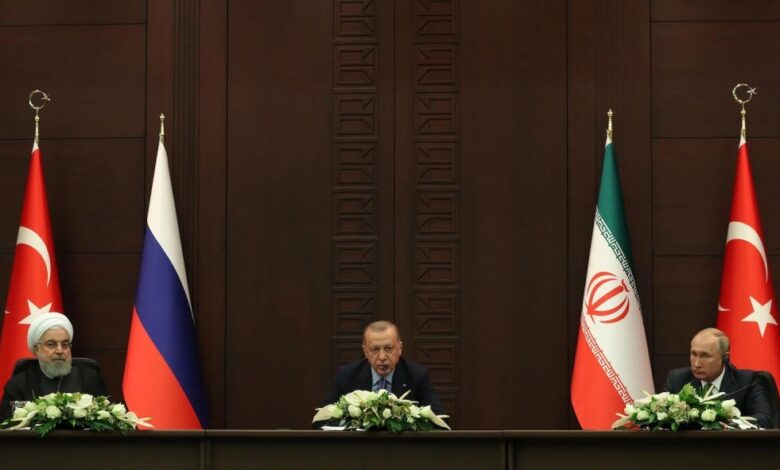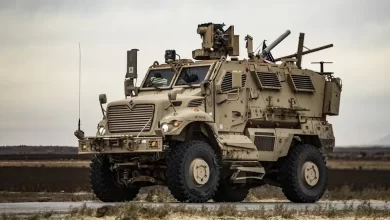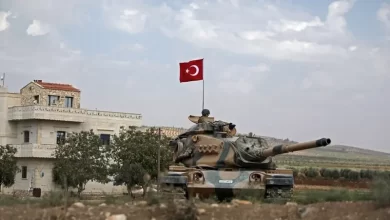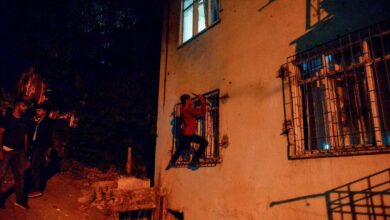Russia and Iran Seek to Talk Turkey Out of Syria Incursion
Leaders from the three countries meet today in Tehran to talk Syria, the war in Ukraine, and wider regional issues.

looking at the meeting of Iranian President Ebrahim Raisi, Russian President Vladimir Putin, and Turkish President Recep Tayyip Erdogan in Tehran; Brazilian President Jair Bolsonaro’s election ploy; and Imran Khan’s comeback attempt.
Days after U.S. President Joe Biden made his tour of the Middle East, the leaders of Iran, Russia, and Turkey meet in Tehran for a three-way summit.
Raisi and Putin are trying to talk Turkey out of war. With Russia engaged in Ukraine, Turkey is planning its own “special military operation”—this time against the Kurds in Syria’s north.
In June, Erdogan outlined his plans to target two towns near the Turkish-Syrian border as part of a wider offensive. “We are taking another step in establishing a 30km (19-mile) security zone along our southern border. We will clean up Tal Rifaat and Manbij,” Erdogan said, adding that Turkish forces would then continue “step by step into other regions.”
Any incursion risks upsetting an already internationalized conflict that has made millions of people refugees. The Syrian Democratic Forces (SDF), a group backed by the United States, has warned that a Turkish assault would hamper anti-Islamic State operations in the region.
Dana Stroul, the senior Pentagon official for the Middle East, agrees. On Monday she told a Washington audience that the Biden administration “strongly” opposes a Turkish offensive. “ISIS is going to take advantage of that campaign, not to mention the humanitarian impact,” Stroul warned.
Russia and Iran have their own reasons for wanting to keep things as close as possible to the status quo in Syria, each country having invested considerable military might (both direct and indirect) over the past 11 years keeping Syrian President Bashar al-Assad in power.
“At the end of the day, the Iranian-Russian game plan is pretty straightforward: they want Assad to stay in power and to give Assad as much control over as much of Syria as possible” Alex Vatanka, the Iran program director at the Middle East Institute, told Foreign Policy.
Iranian-backed militias and Syrian government troops are preparing for confrontation with Turkish forces, or at least seeking to deter their advances. The Shiite-dominant settlements of Zahra and Nubl, both close to Tal Rifaat, have been sent reinforcements in recent weeks to fortify defenses and to prevent parts of nearby government-controlled Aleppo from becoming Turkey’s next target.
Iran’s moves in Syria come amid wider wariness over Turkish strategy, with Ankara’s closer ties with Israel and Saudi Arabia sparking fears of a broader anti-Tehran alliance. Hamidreza Azizi at the German Institute for International and Security Affairs explores the issue at length in this MEI blog post.
The meeting is also a chance for timely one-on-one meetings with Russian President Vladimir Putin.
With Erdogan, Putin is likely to continue a conversation begun by Turkish, Ukrainian, and Russian military officials last week about exporting Ukraine’s grain. A deal is expected to be signed as soon as this week to resume Ukraine’s Black Sea grain exports, although U.N. Secretary-General Antonio Guterres warned last week that there was still work to be done to reach a final agreement.
Today’s talks also come as the White House warns of increased cooperation between Iran and Russia on military hardware. Last week, U.S. National Security Advisor Jake Sullivan warned that Tehran was preparing to provide Moscow with “hundreds” of drones for use in Ukraine. Last Friday, CNN reported that Russian officials had recently visited Iran to view the aircraft in person.
While the military cooperation is significant, it’s not an indication of a broader alliance forming between Tehran and Moscow, who are both competing on the energy market to find buyers for sanctioned oil, Vatanka said: “There is a very heavy dose of anti-Americanism that they both have, and that brings them together. Is that enough to call it a strategic relationship? It might go in that direction, but I think it’s still premature to call it that.”
BY foreignpolicy





